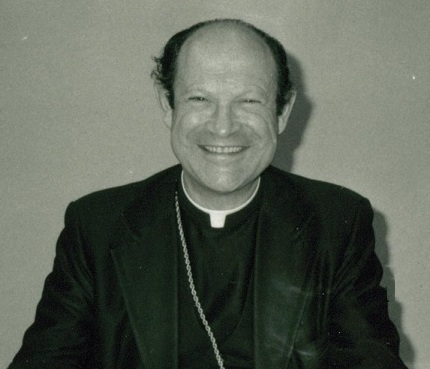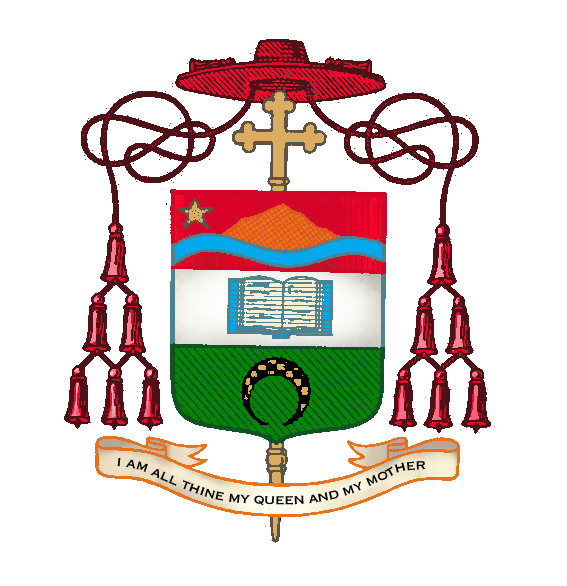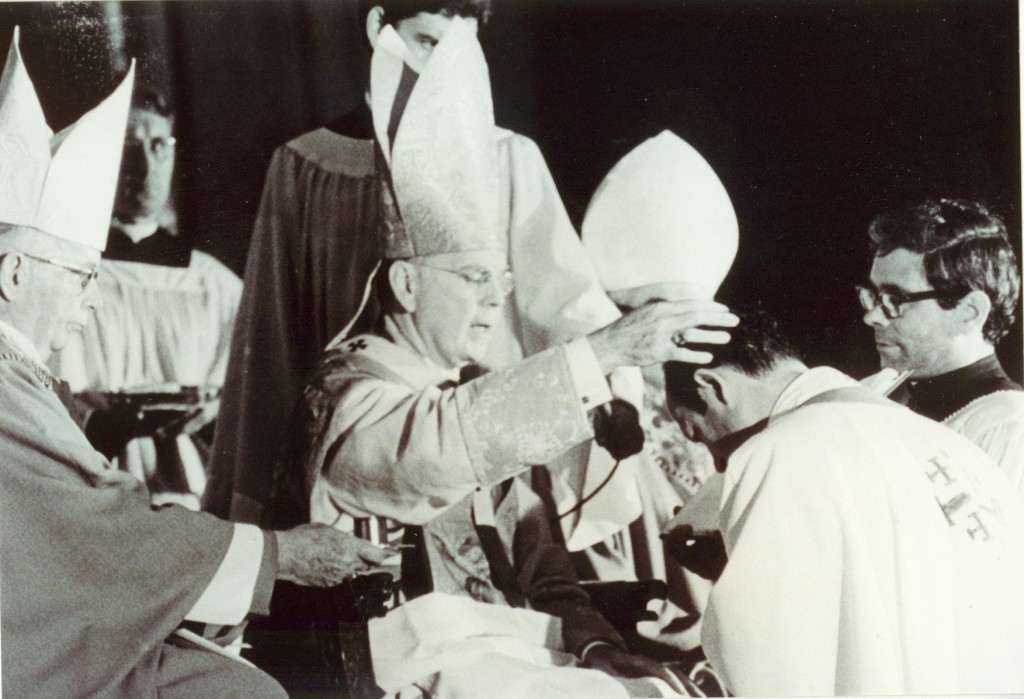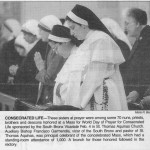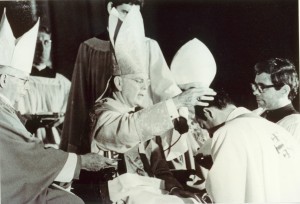 FEAST OF SAINT PETER AND SAINT PAUL June 29, 1977
FEAST OF SAINT PETER AND SAINT PAUL June 29, 1977
Homily for the Ordination of Three Bishops
The Most Rev. Francisco Garmendia, D.D.
The Most Rev. Theodore E. McCarrick, Ph.D., D.D.
The Most Rev. Austin B. Vaughan, S.T.D., D.D.
HOMILY – FEAST OF STS. PETER AND PAUL – ORDINATION OF BISHOPS – JUNE 29, 1977
by Fr. Benedict J. Groeschel, O.F.M. Cap. Director of the Office for Spiritual Development – New York Archdiocese
Today, we celebrate the feast of two men who more than any others in the New Testament proclaimed their unworthiness and, who more than any others, made it clear that all they had received was a gift from God to be used for His glory in Christ Jesus. In fact, Peter is the only person in the Gospels to explicitly confess to Jesus that he is a sinful man; while Paul states clearly that he is not even worthy to be an apostle. Today, as we come together to celebrate the bestowal of spiritual gifts on these three priests and on the Church of New York through their ordination to the order of bishop, it is most appropriate for us to mediate on the gospel text for this feast day to learn more deeply the power of the humble confession of faith in the performance of the work of salvation.
The humble fisherman who has confessed “Depart from me for I am a sinful man” (Luke 5:8) hears the Lord not only proclaim him to be the rock and foundation stone of the Church, but he is also told that his faith in Jesus as the Messiah is a gift from the Heavenly Father. He can take no credit for his faith yet he receives blessings for himself and for the whole church because of his faith.
The significance of this confession and of the response of Christ is brought out by St. Augustine who writes “To Peter alone, was it given to play the part of the whole Church…for it was not one man but the unity of the Church which received those keys. By this fact the pre-eminence of Peter was proclaimed in that he was the figure of the very universality and unity of the Church”… (Serm CCXCV). But Peter was told to be more than a rock, more than, as it were, a static foundation to preserve the truth of revelation against the forces of hell. He was told that he must fulfill the more dynamic roles of binding and loosing, of feeding the flock, of strengthening his brethren and with them of carrying the Gospel to the ends of the earth.
But Peter receives these gifts amidst constant reminders of his own personal weakness, of his complete dependency on Christ for salvation. “Remember, Satan has asked for you that he might sift you as wheat but I have prayed for you that your faith may never fail. You, in turn, must strengthen your brothers” (John 22:21). Even when the pastoral office is in all finality bestowed upon Peter by the Risen Lord, “Feed my lambs, feed my sheep,” it is done in the context of the remembrance of Peter’s denial.
And so the office of Chief Bishop and Pastor of the church is first promised and then conferred amid confession of weakness and contrition for sin. How well is this summed up by Paul when he teaches that “this power is made perfect in weakness.” This is not some neat rhetorical abstraction; it is real. Peter had looked with need and repentance to Jesus so often and the look of Jesus had been strength and salvation for him and for the Church.
Moreover, there was that very poignant incident in Peter’s life when it was written that “the Lord looked on him and he went out and wept bitterly” (Luke 22:54-62). St. Augustine writes that “his going out is his confession that he wept bitterly because he knew what it meant to love. He had been bitter with grief but soon there was sweetness,” the sweetness of the loving forgiveness of the Risen Lord followed him.
Today, the office given to the Church and especially to the bishops of the Church through Peter and the apostles is given to these three priests. It is given at a very crucial period of Church history. They, like Peter and the Apostles and the bishops down through the ages, are to be solid foundations for the unchanging dogmas of Christ and the Church. They are to confirm us their brethren in these tunes when many things grow old and change, when new things as well as old, must be brought out of the household closet of the Church. They must feed us the lambs and sheep of Christ with the spiritual food which so many desperately crave in our own highly materialistic and neo-pagan culture. They must go out with compassion to those who are like sheep without a shepherd. The times in which these three men will serve in the office of bishop are times of crisis in so many ways that we do not have time to elaborate them. But every crisis in the history of the Church has offered new opportunities for growth and new testimony to the power of the grace of Christ, as the crises in the work of Peter and Paul have manifested the great things these men were to do in His Name. Do not be without hope.
The painful crisis of our times could well result in the providential healing of the wounds of the Church through Christian reunion. The crisis may lead to a more profound affirmation of the Incarnation and Redemption in contrast to the melancholy skepticism of modern thought. The serious social problems of our age are already providing the church with new and meaningful opportunities for the proclamation of justice and peace founded on the teaching of the gospel. The crisis in moral teaching so confusing to many may shock those who have strayed from the law of the Lord into a heartfelt and profound confession that the peace of Christ is only given to those who obey the commandments.
The possibilities and crises of these times together bring forth great responsibilities. These responsibilities were clearly summed up for bishops in the recent statement of the Holy Father for the American Bishops attending the canonization of St. John Neumann. “The faithful preaching of the word of God, in all its purity, with all its exigencies, in all its power, constitutes the highest priority of our ministry.” Let Peter remind us and Paul proclaim to us that only in humble confession and in complete reliance on the Father and on the power of Christ’s intercession in the Church can you do anything. On one hand, “without Me you can do nothing,” on the other hand, “I can do all things in Him who strengthens Me.”
Dear Theodore, Austin and Francis, today, we all say to you, grow in holiness and humility like Peter and Paul the rest of your days, so that you may be truly fishers of men in our own times; so that you may be rocks of solid doctrine keeping alive and safe the revelation of Christ and the sacred tradition of the Church; so that you may bind and loose for us in our moral lives in this confused and worldly age; so that you may confirm your brothers in hours of trial and moments of shaken faith; so that you may feed the lambs and “sheep that we may not be like sheep without a shepherd.
Keep your eyes always fixed on Jesus; with Peter and Paul, so that the work of Christ may be done in our days, and so that eventually Paul’s vision of the work of the Church be fulfilled; “All of us, gazing on the Lord’s glory with unveiled faces are being transformed from glory to glory into his very image by the Lord who is the Spirit.” (3 Cor. 3:18).
Queridos Theodore, Austin y Francisco, hoy, todos de nosotros les decimos: Cresca en santidad y humildad como Pedro y Pablo; para que sean verdaderamente pescadores do los hombres en nuestros tiempos; para que sean piedras de una fe viva; para que puedan fortalecer la fe de tus hermanos en momentos de tentación y prueba; para que puedan cuidar los corderos.
Levanten la mirada hacia Jesus, del cual viene muestra fe, para que la obra de Cristo sea cumplida en nuestros dias y para que la vision de San Pablo de la obra de la Iglesia también sea cumplida; “Por eso todos nosotros andamos con el rostro descubierto, reflejando como un espejo la gloria del Señor, y nos vamos transformando en imagen suya mas y mas resplandeciente, por la acción del Señor, que es espiritu.”
NOTE: I wish to express my thanks to Father Richard Adams, Spiritual Director of St. Joseph’s Seminary for his assistance with the English and Spanish texts of this homily.
Father Benedict Joseph Groeschel, O.F.M.Cap,
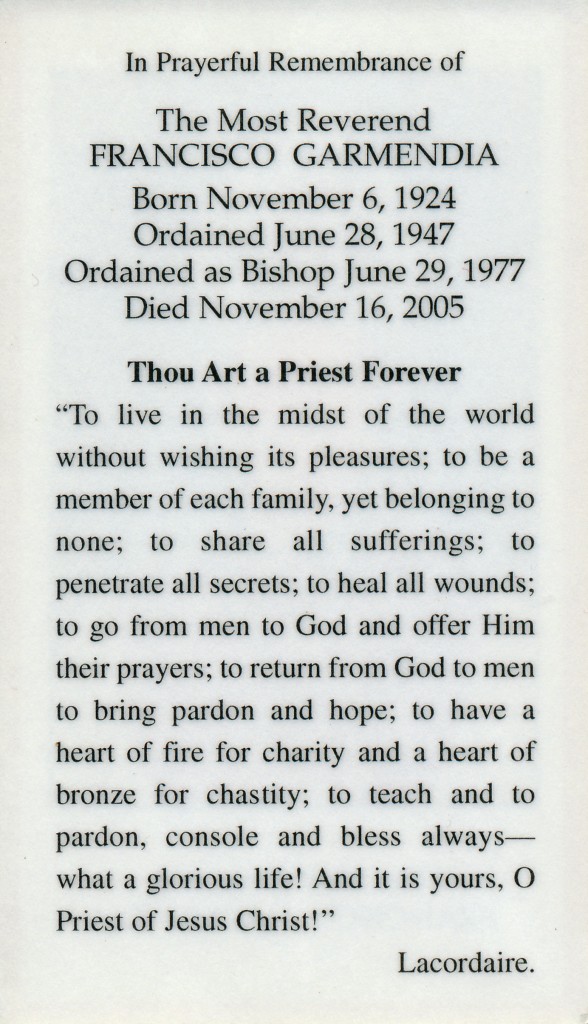 A small group of close friends, gathered around the bedside of our dear friend Bishop Francisco Garmendia knowing it would not be long before he would leave us. What can you do or what can you say? He had already passed into that area of what is often referred to as the “Vestibule of Heaven.” It was sad. He had been ill for over 4 years. His memory would fail him at times but not his faith and deep love of Our Blessed Mother. The Rosary was his companion as it had been all his life. Each of us remembered him from other days. To all, he was a shepherd, pastor, teacher and friend.
A small group of close friends, gathered around the bedside of our dear friend Bishop Francisco Garmendia knowing it would not be long before he would leave us. What can you do or what can you say? He had already passed into that area of what is often referred to as the “Vestibule of Heaven.” It was sad. He had been ill for over 4 years. His memory would fail him at times but not his faith and deep love of Our Blessed Mother. The Rosary was his companion as it had been all his life. Each of us remembered him from other days. To all, he was a shepherd, pastor, teacher and friend.
